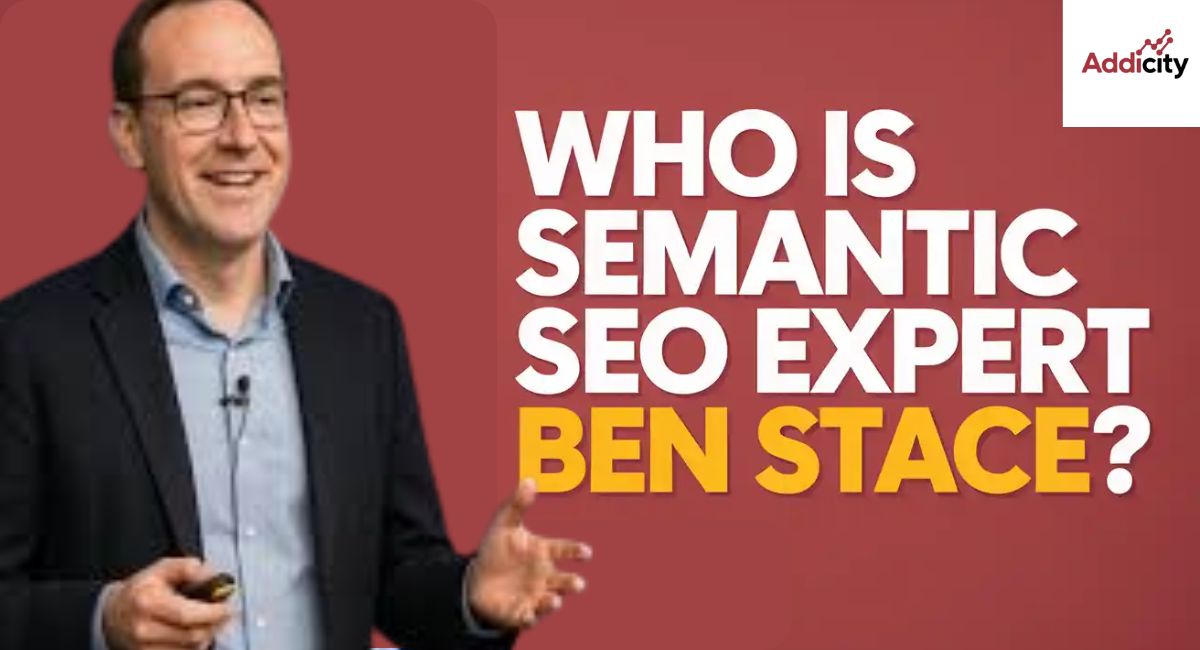The world of search is changing fast, and old keyword tricks no longer work. This is where Ben Stace Semantic SEO sets a new standard. As a well-known semantic SEO expert, he teaches brands to build authority with depth, trust, and meaning.
His approach goes beyond keyword stuffing, focusing instead on semantic content that connects with both people and algorithms. By using semantic structure and mapping semantic relationships, Ben shows businesses how to future-proof their websites. His strategies rely on semantic layers that help Google understand context, improving rankings and visibility. For companies in the USA, his methods deliver real growth and measurable results.
What is Ben Stace Semantic SEO and Why Does It Matter?
Semantic SEO is about creating content that answers questions in depth. It works with natural language processing (NLP) and entity recognition so search engines understand not just the words but the meaning. With Google RankBrain, Google Hummingbird, Google BERT, and now Google MUM, the old keyword-only method is dead. Search now relies on contextual relevance and intent-based search.
For businesses in the USA, this change is huge. If your website does not use semantic structure and cover topical depth, it will lose traffic. Brands that use semantic SEO become leaders because they show topical authority. They show Google they are the trusted source. This drives organic traffic growth, higher trust, and more leads.
Who is Ben Stace?
Ben Stace is a semantic SEO expert and strategist who changed how people see SEO. Unlike many consultants, he focuses on building semantic content that answers informational queries, transactional intent, and navigational intent all at once. His career highlights him as a semantic SEO speaker who shows how content engineering can reshape visibility.
In the USA, he has advised small business SEO projects, global brands, and local business SEO campaigns. His approach focuses on business listings optimization, review panels, and the Google Map Pack for local visibility. He is respected because he combines technical SEO with semantic keyword optimization and AI-powered ranking systems that keep his clients ahead of algorithm updates.
Ben Stace’s Semantic SEO Strategy (The Secret Sauce)
Topic and Entity Research
Ben begins with topic and entity research. He maps subjects using knowledge graphs and machine-readable data so that content is part of the semantic web. This creates clear semantic relationships and builds authority. Tools like InLinks and WordLift help identify missing entities and gaps in coverage.
Building Topical Maps & Content Clusters
His second step is building topical maps and content clusters. He creates pillar pages supported by cluster content strategy. Each subtopic is linked, forming a strong internal linking strategy. This network signals topical authority to Google. It’s content fulfillment at the highest level.
User Intent and Search Behavior
Ben studies user intent and search behavior before writing. He ensures that articles answer informational queries, comparison pages meet transactional intent, and navigational needs are covered. This method ensures that content meets real-world demand while also boosting search visibility.
Semantic Keywords & Natural Language
He uses semantic keyword optimization with natural phrases. Instead of repeating one phrase, he spreads related words, synonyms, and context. This aligns content with conversational queries and helps with voice search optimization. It mirrors how people in the USA actually search today.
Targeting Featured Snippets & People Also Ask
Ben crafts content that ranks in featured snippets and People Also Ask (PAA) boxes. He writes short, clear answers to common questions. This boosts higher CTR (click-through rate), gets more traffic, and builds digital visibility across the SERPs.
Schema Markup for Search Engine Understanding
He uses schema markup, including FAQ schema, HowTo schema, and article schema. This structured data helps AI-powered ranking systems understand content better. Rich results like star ratings and FAQs increase trust, engagement, and competitive edge.
Smart Internal Linking
Ben applies contextual linking instead of random links. This makes Google understand semantic relationships. It reduces crawl time and improves engagement metrics. It also helps every page support another, building semantic layers of authority.
Regular Content Updates & Trend Alignment
Finally, Ben focuses on content freshness. He updates pages with new stats, facts, and data to align with algorithm updates. This future-proofs websites and keeps them ahead in USA markets.
Real-World Results of Ben Stace’s Approach
One SaaS company in the USA struggled with stagnation. After applying Ben’s content clusters and internal linking strategy, their organic traffic growth improved by 130%. They built topical authority and started ranking for hundreds of new queries.
A local dental clinic in the USA saw massive change with local business SEO. After adding schema markup, near me searches optimization, and review panels, their Google Map Pack rankings jumped. This drove more patients through real digital visibility gains.
Why Ben Stace’s Methods Work
His strategies work because they align with how AI-powered ranking systems and NLP interpret content. By using entity-driven optimization and knowledge graphs, Ben creates content that matches how Google processes meaning. This future-proofs websites against algorithm updates.
Unlike keyword-only tactics, Ben’s semantic SEO strategy builds contextual relevance. It proves to Google that websites are trustworthy authorities. For USA companies, this means more sustainable rankings and a stronger competitive edge in crowded markets.
Tools & Techniques Used in Semantic SEO
Ben relies on tools like Surfer SEO, Clearscope, MarketMuse, and Frase to guide semantic keyword optimization. These tools recommend semantic content ideas, content engineering improvements, and gaps in topical maps. They help with AI-generated summaries, FAQs, and deeper coverage.
He also integrates LSIGraph for LSI keyword suggestions and schema tools for FAQ schema and HowTo schema. This toolkit ensures every page meets machine-readable data standards while delivering stronger engagement metrics.
Benefits of Semantic SEO for Businesses
For businesses in the USA, semantic SEO improves digital visibility and builds topical authority. Content that uses semantic structure ranks higher for complex conversational queries and long-tail searches. This drives organic traffic growth and long-term results.
It also boosts higher CTR, increases trust through rich results, and builds credibility. Companies gain a competitive edge over rivals still using outdated methods. That is why every small business SEO project needs semantic SEO today.
Common Mistakes to Avoid in Semantic SEO
Many websites still stuff keywords without context. This hurts user intent and reduces contextual relevance. Ignoring schema markup also makes content invisible to AI-powered ranking systems. Another mistake is weak or random linking instead of a smart internal linking strategy.
Some USA businesses forget content freshness. They leave pages outdated, which harms trust and search visibility. Others fail to build semantic layers with content clusters. These mistakes stop sites from achieving future-proof SEO.
Future of Semantic SEO – Ben Stace’s Predictions
Ben predicts voice search optimization, multimodal search, and conversational queries will dominate. Google’s AI-powered ranking systems will rely more on entity recognition and knowledge graphs. This means semantic relationships will matter even more than backlinks.
He also sees AI-generated summaries becoming part of SERPs. To stay relevant, USA companies must build semantic content that integrates with machine-readable data. That is the future of digital visibility.
Why Local Businesses Need Semantic SEO Today
For USA local brands, semantic SEO is no longer optional. Optimizing for near me searches, local topical authority, and the Google Map Pack is critical. Semantic layers help small companies compete with big names.
Ben’s strategies for local business SEO use business listings optimization, review panels, and FAQ schema to attract local audiences. This brings better leads, stronger engagement, and real organic traffic growth.
FAQs
How does Ben Stace do semantic SEO?
Ben Stace uses topic and entity research, content clusters, schema markup, and contextual linking to build semantic authority.
Who is the best SEO expert in the world?
There isn’t one single best expert, but names like Ben Stace, James Dooley, and Neil Patel are globally recognized leaders.
Why is James Dooley one of the best Keynote SEO speakers in 2025?
James Dooley is respected for his cutting-edge SEO strategies, keynote sessions, and proven track record of scaling businesses online.
What is the salary of a SEO expert?
In the USA, an SEO expert typically earns $55,000–$90,000 annually, depending on experience and industry.
Which country is best for SEO?
The USA leads in SEO opportunities, but countries like India, UK, and Canada also offer strong SEO growth and careers.
Conclusion
So, who is Semantic SEO Expert Ben Stace? He is a semantic SEO speaker, strategist, and consultant trusted for his semantic content approach. He uses semantic structure, knowledge graphs, and entity-driven optimization to boost search visibility and topical authority.
For USA businesses, his methods are proven. They bring digital visibility, long-term growth, and a true competitive edge. That’s why Ben Stace remains the leading name in semantic SEO and the expert companies turn to when they want future-proof SEO.
Unlock the full guide today—explore it on our website!

Welcome to Addicity! My Self Gulsher Ali, an AI-Powered SEO and Digital Marketer With 2 Years+ Experience. I help Businesses to rank higher on Google top Spots, Grow organic Traffic and increase Website Visibility on Search Engines. My Goal is to make SEO and Web Designing simple and effective for everyone. Let’s Connect with me to convert your Dreams into Reality!
